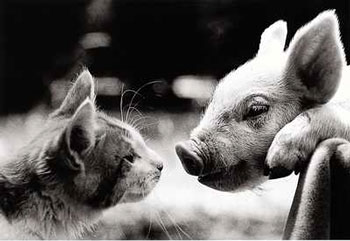The importance of our dogs’ health is as important to us as our commitment to our concern for all animals. In trying to live a healthy and compassionate life, we choose a vegetarian diet and a cruelty-free lifestyle for ourselves and our dogs.Evidence shows that dogs are not only able to live on a vegetarian diet, but that they do very well on them (the oldest living dog is vegan!). According to veterinarian Bruce Fogle D.V.M. in the ASPCA Complete Dog Care Manual “Unlike cats, dogs are not true carnivores. They can survive on vegetarian diets because they can convert vegetable protein and fat into the ingredients necessary for all bodily functions.” Just as with any diet, no matter what your preference of foods, there are healthy ways of eating and not so healthy ways and we must be sure to provide balanced nutrition .We make sure that Linus and Lucy get every vitamin, mineral and supplement they need to live a healthy and hearty life. They have been vegetarian dogs for almost 2 years now and have been very healthy thus far. Their coats are shiny, they are active and vibrant and love their quality vegan dog food (that mom put lots of research into choosing!). Their toys, treats, shampoos and accessories are all free from animal products, testing and ingredients and instead made with all natural and organic ingredients. They LOVE it all, from bathtime to snacktime to dinnertime.
Why did I choose this type of diet for my canine kids? Well, for two reasons. First, while debating whether to switch them to a vegetarian I read an article about what REALLY goes into commercial dog foods and I decided I wanted no part of it near my dogs or my wallet! Ann N. Martin, author of Foods Pets Die For and Protect Your Pet: More Shocking Facts is recognized as an authority on the commercial pet food controversy and the ingredients and hazards contained in them. Her years of research have lead her to uncover many shocking facts about pet foods which she reveals in her books. Regardless of what type of diet you choose for your dog, this book contains important information for all pet food consumers. For more information online, check out:
Dog Eat Dog: What's Inside The Food We Feed
Polluted Pet Food
Those Dirty Dogs, An Expose
The Actual Ingredients Meat Based Pet Food Companies Use in Dry and Canned Foods (downloads as a microsoft word document)
For a guide to pet food ingredients check out the Dog Food Comparison Charts so that you can find out which foods contain unwanted ingredients and which are safe and healthy.
The second reason I chose to put Linus and Lucy on a vegetarian diet is because of my strong feelings about ethical animal treatment and all it’s aspects. Concerned that it’s wrong? Unnatural? Here’s some food for thought from VeganCats.com:
Is it really more wrong to ask your cat or dog to eat a healthy vegetarian diet than it is to subject countless cows, chickens and pigs to the brutal torture of the factory farm?
When you purchase slaughterhouse products, you are increasing the profitability of animal slaughter by contributing directly to the consumer demand for its products. In so doing, you are undermining the goals of the pro-animal movement and contributing to animal cruelty in a way that is equally as direct and meaningful as if you were buying hamburgers.
Isn’t meat their natural diet?
Dogs and cats live in the uniquely unnatural environment of our homes. While “in nature” they would hunt, food now magically appears twice daily in their bowls. They are given medicine to cure illnesses, and are surgically sterilized to control their reproduction. Why insist that their diet alone remain “natural”- especially when it must come at the expense of other animals’ lives?
What’s Really in Meat-Based Pet Food:
*Carcasses of euthanized cats & dogs (some with flea collars and containing sodium pentobarbital used for euthasia).
*Unwanted insecticides and pharmaceuticals from diseased livestock (complete with plastic ID tags).
*Rotting supermarket rejects including plastic and styrofoam packaging.
*Animal parts deemed “unfit for human consumption” (heads, legs, tongues, intestines, esophagi, beaks, feathers, bones, blood, lungs, ligaments, etc.)
*Diseased and cancerous body parts from the 4 D’s: dead, dying, diseased, & disabled factory-farmed animals
Is it possible to argue that any of these are the “natural” diet of your cats and dogs?
What is "natural" has never been the basis for what is ethical anyway. Morality is based on a vision of what ought to be, not on a dogmatic adherence to whatever has historically been.
If you or someone you know is interested in learning more about vegetarian diets for companion animals or people or for more information on animal cruelty and what we can do, check out www.compassionateplanet.com

”We call one a pet and the other food…Why?”